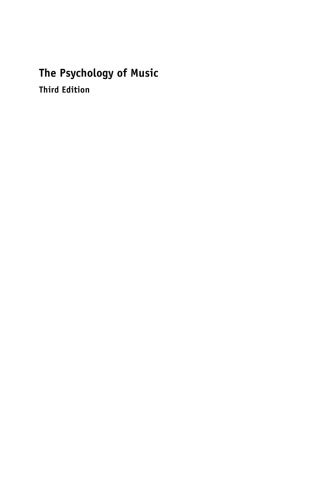(Ebook) The Psychology of Music, Third Edition by Diana Deutsch ISBN 9780123814609, 012381460X
The aim of the psychology of music is to understand musical phenomena in terms of mental functions-to characterize the ways in which one perceives, remembers, creates, and performs music. Since publication of the First Edition of The Psychology of Music, the field has emerged from an interdisciplinary curiosity into a fully ramified subdiscipline of psychology as a result of several factors. First, the opportunity to generate, analyze, and transform sounds by computer is no longer limited to a few researchers with access to large multi-user facilities, but is now available to individual investigators on a widespread basis. Second, dramatic advances in the field of neuroscience have profoundly influenced thinking about the way the brain processes music. Third, collaborations between psychologists and musicians, which were evolving at the time the First Edition was written, are now quite common, and to a large extent these two groups speak a common language and agree on basic philosophical issues.The Psychology of Music, Second Edition has been completely revised to bring the reader the most up-to-date information and additional subject matter, and new contributions examine all of these important developments.Encompasses the way the brain perceives, remembers, creates, and performs musicContributions from the top international researchers in perception and cognition of musicDesigned for use as a textbook for advanced courses in psychology of musicReview"The attributes of The Psychology of Music are thoroughness, authority and clarity. That one volume can so adeptly select, draw on, arrange, assess, amplify its material and invite the reader to draw meaningful and reliable conclusions relevant to his/her love of music is a huge achievement. That the book does so with apposite and well-adduced illustrations while at the same time blending technical and specialist accuracy with accessibility is remarkable. Thoroughness and interest, a refreshing amalgam of (the authors') enthusiasm with their collective and individual command of the literature and practices in the field(s) of each make it nothing short of superb as a reference (to be consulted) and a narrative (to be read from cover to cover) by lovers of serious music of all types." - Excerpt of review by Mark Sealey for www.classicalnet.com From the Back CoverThe aim of the psychology of music is to understand musical phenomena in terms of mental functions -to characterize the ways in which one perceives, remembers, creates, and performs music. Since publication of the first edition ofThe Psychology of Music, the field has emerged from an interdisciplinary curiosity into a fully ramified subdiscipline of psychology as a result of several factors. First, the opportunity to generate, analyze, and transform sounds by computer is no longer limited to a few researchers with access to large multi-user facilities, but is now available to individual investigators on a widespread basis. Second, dramatic advances in the field of neuroscience have profoundly influenced thinking about the way that music is processed in the brain. Third, collaborations between psychologists and musicians, which were evolving at the time the first edition was written, are now quite common, and to a large extent these two groups speak a common language and agree on basic philosophical issues.The Psychology of Music, Second Edition has been completely revised to bring the reader the most up-to-date information and additional subject matter, and new contributions examine all of these important developments. The book is intended as a comprehensive reference source for musicians, psychologists, and students interested in and studying this exciting psychological discipline. [C:\Users\Microsoft\Documents\Calibre Library]
*Free conversion of into popular formats such as PDF, DOCX, DOC, AZW, EPUB, and MOBI after payment.


